Sandra Beasley's Blog, page 7
September 26, 2016
Report from the National Book Festival
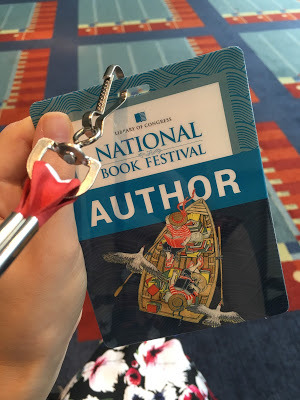
Last Wednesday, when the Politics & Prose cashier slipped a National Book Festival bookmark in between the pages of my purchase (a paperback copy of Howard Norman's I Hate to Leave This Beautiful Place), I blurted out: "I'm going to be there."
She was kind enough to tilt her head and say, "I thought your name sounded familiar."
When Rob Casper of the Library of Congress called back in early August, I was standing in a New Jersey kitchen. We had gone up to help my brother-in-law's family move in, and I had taken on cooking duties for the weekend. The reception was echo-ey, faint. I shook the water off a cutting board before making my way to the porch, where I could make out Rob's voice more clearly. A slot had unexpectedly opened up on the "Poetry and Prose" stage for September 24. Did I want to read?
Yes. Yes.
It's funny how we can hear something, and carry on our half of the conversation, without hearing the idea behind the words. My inner pragmatic piped up: you're local. You're an easy add in terms of the budget. This was an NEA-sponsored stage, and I hold a 2015 Fellowship. I have a new-ish book out. I ascribed being asked to an intersection of conveniences, a series of checkboxes I happened to fill. I was happy to say Yes. I forgot to say to myself, Hey, this is once-in-a-lifetime. Or You earned this.
Then the bookmark moment. Then my mom emailing everyone in the family, You are in the Book World section of the Post! And it all started to feel really, really real.
Waiting to be admitted to the Friday night shindig at the Library of Congress, I watched a man come up the steps behind us. I recognized him by his eyebrows. "That's Salman Rushdie," I muttered softly to my husband.
"Well, we're probably in the right line, then," he replied.
The guard waved his wand suspiciously up and down Hervé Tullet's torso while the tall, wiry-haired children's author turned in a slow circle. Kareem Abdul-Jabbar was, literally, a head above every other person in the room. The bartender searched for a fresh ginger beer to top off a waiting line of Moscow Mules while Geraldine Brooks waited patiently for her drink, resplendent in a navy crinolined dress. Joyce Carol Oates darted around, tiny and sparrow-like, wearing a black hat with a wide brim.
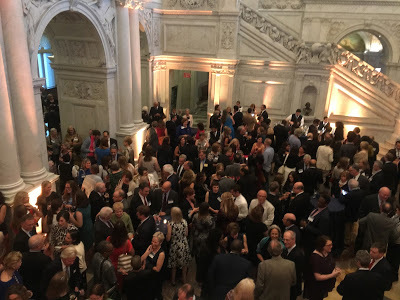
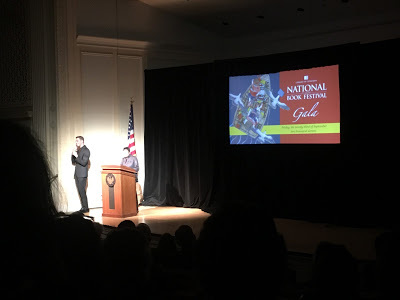
Newly appointed Librarian of Congress Carla Hayden got a hearty round of Woooo from the crowd. The speakers included Edwidge Danticat, James Gleick, and Marilynne Robinson. I've been in the Library of Congress's Jefferson Building for a dozen receptions, but never anything quite like this. There were stations for shrimp and grits, mini-tacos with five different salsa, peking duck rolls and pork buns. I was allergic to all of it, but happy to get another Moscow Mule with a red-and-white striped straw. A few members of the catering staff had been recruited to re-enact the gondola pose from this year's NBF poster for a tableau set up in the middle of the room.
The next morning, my husband and I left an hour early to trek all of five stops north on the Green Line; that's how nervous I was to not miss Stephen King. Trying to get oriented at the Convention Center, any doubts we had about which door was for the Authors / VIPs was assuaged when the black SUV carrying Kareem Abdul-Jabbar's team pulled up. I met Karen, in her periwinkle volunteer t-shirt, who I knew would help us get into the ticketed auditorium. I did a double-take when I realized that the entirety of her volunteer work, for the day, was "handling" me. The bonus, she pointed out, was that it meant she got a seat for Stephen King as well.
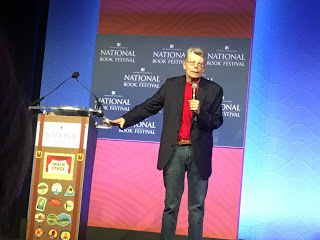
We were second row, dead center. I know he does talks all the time, all over the country, but Stephen King felt present. He showed us his iPad, the remarks he'd drafted for the occasion. Between anecdotes about his modest beginnings (having five people show up for the first Carrie signing), his pride in raising a family of authors, and a dollop of political commentary (he compared Trump's speechifying to "a piano falling down a flight of stairs"), he hewed to the topic of fostering not just literary enthusiasm, but literacy. His philanthropy in Maine is apparently sprawling--he was receiving an award for it--but he found himself hesitant, he said, to talk about something he'd always regarded as needing to be a private act.
Hearing King speak has been a bucket-list goal. His imagery, his sense of both the poetic and perverse, was a foundational inspiration for me. I devoured his books. Nightmares and Dreamscapes is still kept handy on the shelf in my bedroom.
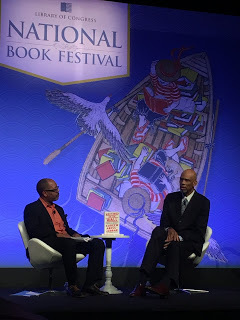
I brought less expectations to hearing Kareem Abdul-Jabbar, simply because I know less about him, but I'd been intrigued since reading Jay Caspian Kang's substantive profile of him for the New York Times Magazine a year ago. He was wonderful: poised, erudite, frank in his approach to racial iniquity ("The only equal opportunity employer for desperate people is crime"), grounded in his faith. Anyone who gets a question about the tradition of the detective story, admires Sir Arthur Conan Doyle, and then self-corrects mid-sentence to also credit Edgar Allan Poe's "The Murders in the Rue Morgue" gets my loyalty. A child asked him whether he prefers being an author or a basketball player. Easy answer, he said--at this point, he's in no shape for the court. I'm glad we've signed him up for Team Author.
After a hurried lunch of dumplings, I met up with Karen, who walked me down to the signing floor. I wasn't expecting a line--Count the Waves has been out for over a year, with the paperback on the horizon in December. But the dozen or so people I talked with included students from the Writer's Center and American University, two young aspiring poets, the owner of a bookstore up in western Massachusetts who had trekked down for this festival, a heretofore virtual Facebook friend, and a random nice guy who'd found himself in a neighboring line next to my husband. Not to mention the woman who runs a local poetry-book club, which I promptly invited myself to come visit. I'm counting each handshake or hug as an individual victory.
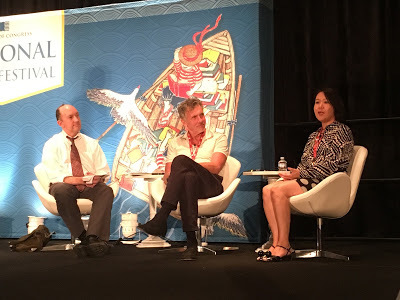
Our last program of the day was spur-of-the-moment--Michael Cunningham and Yuko Shimizu, with my friend and Washington Post Magazine editor David Rowell moderating. Shimizu designed this year's NBF poster, and the two collaborated on Cunningham's reworking of fable and myth, A Wild Swan and Other Tales; a hypnotizing slideshow of illustrations cycled on a screen to the side of the stage. The conversation was lively, and for a writer married to an artist, it was the perfect date-night note to end on. (To be precise, the "date night" then extended to mezcal cocktails, guacamole, and ceviche at Espita Mezcaleria, two blocks up 9th Street.)
Two small regrets: I couldn't get away to visit the folks selling books for Politics & Prose. And I didn't speak to Congressman John Lewis, though I was thrilled to sit at an adjacent table in the author's lounge for a while. He emanated a stately calm and--on a weekend that featured the opening of the National Museum of African American History and Culture--a distinct, if slightly exhausted, joy. Being adjacent was enough.
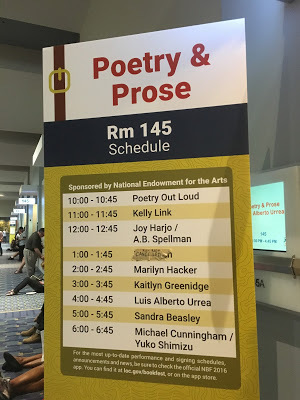
I read right before Michael Cunningham and Yuko Shimizu. I was touched by the presence of familiar people in the crowd--Rob from LOC, Amy Stolls of the NEA, former students, friends from MFA days and from local literary organizations, fellow DC poets, many of whom have heard me read before and who had so many fancier options of places to be in that moment. I hope I remembered to thank all of them. I thanked Karen. I thanked my husband. I thanked the woman holding up the timecards. I did not thank Siri, who at one point attempted to chime in on the reading. I thanked the ASL translator who dealt with signing "word splooge" on the fly.
Though I walked up to the podium with I Was the Jukebox in hand, three poems marked, I decided not to read from that collection. I've been fortunate that book has had such long legs. It's usually a relief to reach for poems that are funny and conversational. But the poems from Count the Waves, as difficult and more somber as they may be, are what got me an NEA grant. You gotta dance with the one who brung you. I read new poems, including a sestina, a sonnet, and my contribution to Still Life with Poem (I held the anthology up to the crowd's eye). I took questions. I got to mention Langston Hughes, Gwendolyn Brooks, e.e. cummings, Sylvia Plath, and Sandra Cisneros. I got to talk about the fallacy of form "versus" free verse in poetry. Karen saved the day by getting these snapshots, which my mother had made me promise someone would take.
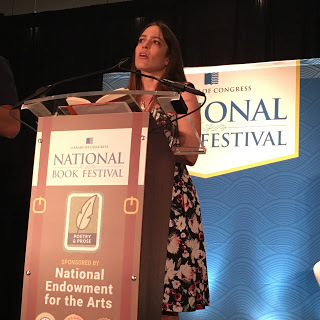
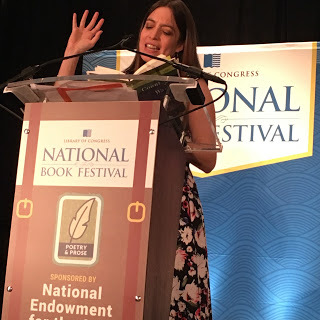
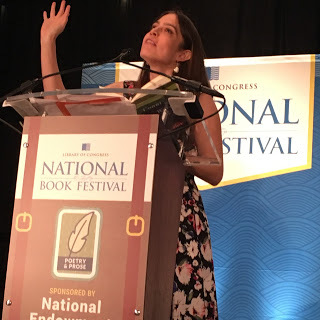
I remember the National Book Festival of a decade ago, back when it was still on the National Mall: standing at the edge of tents in years past, trying to stay out of the mud. Waiting in long lines to meet the authors. I can't believe I got to be one of them.
Published on September 26, 2016 08:07
September 16, 2016
Sharon Olds & Close Reading
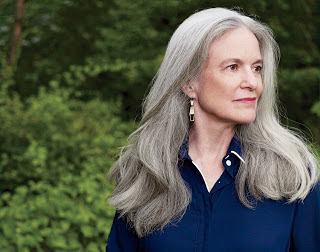
There was a whole lotta rejoicing among poets when the Academy of American Poets announced that Sharon Olds has received this year's Wallace Stevens Award, which recognizes mastery of poetry and carries a $100,000 cash prize. The portrait above is Vogue's version of Olds. While a reminder of her beauty, the version I've encountered in person is more endearing--spectacled, with a constellation of clips and barrettes holding back her thick, long hair. Whenever anyone mentions the need for a more professional haircut because of having reached A Certain Age, and I start to wonder about myself, I picture Sharon Olds and think, Nope. I'm keeping it long and unruly.
I've spent so many years looking up to her work, taking permission and inspiration for my own poems from collections such as The Living and The Dead and The Gold Cell. When I was in college, I gave my mother a copy of Blood, Tin, and Straw, hoping we could form some kind of mother-daughter book club. But I haven't gotten to spend much time with Olds in person. I've spotted her at a AWPs but she seemed both shy and rushed, and I was afraid of bothering her. When we both read at The New School for the 2010 Best American Poetry anthology, she mouthed "I love that poem" as I returned to my seat on stage after reading "Unit of Measure." I about died of happiness. I still didn't have the courage to strike up a conversation. I also spent the rest of the reading trying to see the audience from behind Gerald Stern's hat.
Navigating the creative writing world post-MFA, in the later 2000s, I had sometimes encountered a weird vibe surrounding her work...a weariness? a wariness? I'd mention Sharon Olds as a favorite, then feel like I had to defend myself--and her--the same instinct I had in mentioning Sylvia Plath, another "infamous" poet "of sex and psyche," which is how Billy Collins once described Olds.
When a poet has disproportionate influence over a subsequent generation, one easy way for insecure colleagues to diminish that accomplishment is to claim that the poet in question only has one stylistic mode; one story to tell. I see this sniping happen over and over. I see this happening now. But when Olds published Stag's Leap in 2012, a collection as powerful as anything she has ever written, those trying to do that to her had to bite their tongues. I didn't just carry that book around; I clutched it to my chest.
One way we develop as poets is by expanding our ability to show not just affection for a text, but respect. I have a generation of students in front of me, and I want them to take Sharon Olds as seriously as I do. So I don't just use her work as a gateway drug--a quick hit of thematic satisfaction. We slow down. We look at her decisions on a line-by-line, word-by-word basis. We talk about the metaphors and similes that drive "I Go Back to May 1937," the lineation system (that dangling "I"), and the ways in which the poem formally privileges the observer. We read the December 2015 interview she did with Kaveh Akbar at Divedapper. We immerse ourselves in "Stag's Leap," a study of the in media res opening:
Then the drawing on the label of our favorite red wine
looks like my husband, casting himself off a
cliff in his fervor to get free of me.....
I'm always urging my students toward close reading in their annotations and critical essays. Cite illustrating lines; apply your craft vocabulary; resist the urge to summarize. If reading is an act of computation, I'm more interested in you showing your work than in whether your final answer matches my own to the decimal point. Don't tell me what the poem is about; tell me what you notice of the poet's concerns. I imagine, at times, all this emphasis on close reading is a bit annoying.
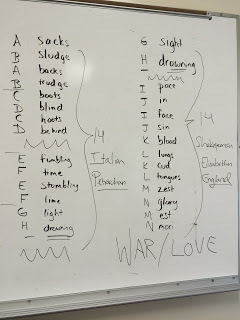
What I don't say out loud, but what I believe, is that "close reading" is the first step to "canon-building." If we want the poets we love to be taken seriously, it's upon us to give future readers the tools to do so. There's a magic that happens when we go from "I really like this" or "this really moves me" to being articulate how, exactly, the poem is working (or playing) on the page. It's the same magic that happens the first time you point out to a student how Wilfred Owen's "Dulce et Decorum Est" is in formal dialogue with the sonnet. One of my longterm projects is a collection of craft essays, and a component of that will be a half-dozen close readings; "I Go Back to May 1937" is at the top of the list. Maybe the next time I see Sharon Olds, I'll have the guts to say hello--and congratulations.
Published on September 16, 2016 09:15
September 8, 2016
On Being Connected
I accidentally crashed my website. Overwrote the code during a WordPress install for another project. And the theoretical backup didn't do the trick.
If you visit www.SandraBeasley.com, you might not notice initially--the very first thing I did was re-create the landing page and the two pages most people come to visit ("Upcoming Events" and "For Hire"). But if you start navigating into the page detail for individual books, you'll come up blank. No hi-res cover art, no purchase info, no blurbs, no record of reviews. I'll spend the weekend rounding that stuff up, and re-editing for website display, and hope that by next week it's good as new.
I would be more devastated if it wasn't something I manage to do every few years. I'm of the cusp generation of modern computer using--we had to take computer science in high school, but we were learning things like Pascal and C++. In other words, when I go into the HTML I know just enough to make a big mistake, and not enough to fix it.
My first website was part of GeoCities; I was a "homesteader" in the Soho neighborhood, which was designated for pages related to arts and writing. Once buying your own domain became a thing--and once I realized there were other Sandra Beasleys out there--I bought the URL of my name and created my first standalone website, painstakingly cobbling together code copied from how-tos. Black background, white font, with bumble-bee yellow accents. Frames and animated gifs were a big deal.
My "about the author" entry was a painfully long, awkwardly personal and yet third-person account of my life to date. The drawbacks of oversharing became obvious when I sat down to dinner with a potential suitor. I made the usual small talk of volunteering facts about myself--grew up in Virginia, daughter of an Army general and a visual artist--only to be met with a muted response. He'd already looked up my website.
Then blogging came along, and this space (with its blessed WYSIWYG editor) became the repository of quirky stories and passing interests. WordPress put professional design within reach. I took at step back and re-conceptualized a website as a streamlined, relatively static resource for a professional career.
The fundamental elements of a good author website:
-Name, at least one photo, professional bio note
-Titles of any books or genres in which you write
-Major media coverage for any publications
-Recent and upcoming activities--readings, festivals
-Services for which you're available
-Hi-res, easily downloadable files for publicity
-Instructions for how to contact the author or a rep
It's important that no one ever need to click more than twice to access content. I think it's better to link outward when you can--whether to a Twitter feed, a YouTube channel, or a lit mag's page--rather than trying to aggregate everything under one roof. That's it, really. Add a shopping cart element, if you have pubs that aren't distributed through traditional or online retail channels. Be sure to look at the site on a cell phone, and an iPad, to see what transitions smoothly and what gets buggy.
(That "buggy" came to mind dates me to the days of running a compiler on my code.)
The last time I crashed my website was in 2015, two days before Count the Waves came into the world. I had no choice but to simultaneously rebuild my website while keeping the conversation going here, on Facebook, and on Twitter. In those moments, it is reasonable to wonder if it is all worth it, this availability. The words I put into the world as an "author" vastly outnumbers the number of words I publish in poems and nonfiction. There is something undeniably strange about that.
Is my website any putting information in people's hands that they couldn't get via Google search or an email query? Does anyone actually read this blog, in the weeks when the only comment I get is a spambot promising twenty-pound weight loss? How many positive Facebook threads counterbalance a random attack or painful misinterpretation? Am I spending the energy of what could have been a paying freelance piece into a series of 140-character shouts into the void?
I don't know, to be honest. None of us do. Writers manage this question of how much to connect, and the vulnerability that creates, day by day. This morning, a spiteful comment to a friend's blog had her debating whether to deactivate her Facebook account. Another friend only dips his feet into that water twice a year. I know authors who have had great success, who travel the world with their work, all without the aid of a website or blog or Tumblr. They have never lost a night's sleep trying to correct something on an outdated Wikipedia page.
There is no magic formula. No one teaches you how to handle this in graduate school. One writer's joy of networking is another writer's personal hell. Every author stands at a unique crossroads of free time, experience, tech savvy, thick or thin skin, financial resources, sense of humor, and desire, all of which shapes the extent to which they do or don't connect beyond the page. I've been part conversations where poets were described as being really putting themselves "out there," a judgment that can quickly turn uncharitable--as if he or she is overcompensating for average talent with supersize social media savvy. I don't believe that, but I understand where the sentiment comes from. Connecting is a privilege and a gift. It's also a skill set.
In Illinois, a high school English teacher's final assignment to his students was to artistically depict a line of poetry from the semester's readings. One of his students chose to illustrate "The Piano Speaks."
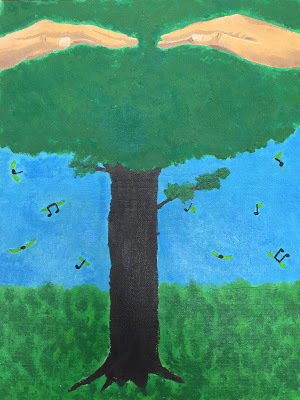
I'm going to try and hold on to the exhilaration of seeing my poem translated into these bright hues this weekend, as I tinker away for hours in WordPress's Customizr template, trying to redo what was undone. I'm also going to try and remember my delight and pride--years ago--in figuring out how to turn a link from blue to purple after it had been visited. I'm going to tell myself, as I always do, that the website will be a little bit better this time around.
There has been a few times someone has said "You're so out there" to me, then paused. I think we're both unsure, in that moment, whether they mean it as a compliment. Yet every time I feel the urge to withdraw, I get pulled back. I only know about this homage to "The Piano Speaks" because that high school teacher felt comfortable sending it my way (and passed along permission to share it here). He texted it to me this morning. Because he has my cell phone number. Day by day, we navigate.
If you visit www.SandraBeasley.com, you might not notice initially--the very first thing I did was re-create the landing page and the two pages most people come to visit ("Upcoming Events" and "For Hire"). But if you start navigating into the page detail for individual books, you'll come up blank. No hi-res cover art, no purchase info, no blurbs, no record of reviews. I'll spend the weekend rounding that stuff up, and re-editing for website display, and hope that by next week it's good as new.
I would be more devastated if it wasn't something I manage to do every few years. I'm of the cusp generation of modern computer using--we had to take computer science in high school, but we were learning things like Pascal and C++. In other words, when I go into the HTML I know just enough to make a big mistake, and not enough to fix it.
My first website was part of GeoCities; I was a "homesteader" in the Soho neighborhood, which was designated for pages related to arts and writing. Once buying your own domain became a thing--and once I realized there were other Sandra Beasleys out there--I bought the URL of my name and created my first standalone website, painstakingly cobbling together code copied from how-tos. Black background, white font, with bumble-bee yellow accents. Frames and animated gifs were a big deal.
My "about the author" entry was a painfully long, awkwardly personal and yet third-person account of my life to date. The drawbacks of oversharing became obvious when I sat down to dinner with a potential suitor. I made the usual small talk of volunteering facts about myself--grew up in Virginia, daughter of an Army general and a visual artist--only to be met with a muted response. He'd already looked up my website.
Then blogging came along, and this space (with its blessed WYSIWYG editor) became the repository of quirky stories and passing interests. WordPress put professional design within reach. I took at step back and re-conceptualized a website as a streamlined, relatively static resource for a professional career.
The fundamental elements of a good author website:
-Name, at least one photo, professional bio note
-Titles of any books or genres in which you write
-Major media coverage for any publications
-Recent and upcoming activities--readings, festivals
-Services for which you're available
-Hi-res, easily downloadable files for publicity
-Instructions for how to contact the author or a rep
It's important that no one ever need to click more than twice to access content. I think it's better to link outward when you can--whether to a Twitter feed, a YouTube channel, or a lit mag's page--rather than trying to aggregate everything under one roof. That's it, really. Add a shopping cart element, if you have pubs that aren't distributed through traditional or online retail channels. Be sure to look at the site on a cell phone, and an iPad, to see what transitions smoothly and what gets buggy.
(That "buggy" came to mind dates me to the days of running a compiler on my code.)
The last time I crashed my website was in 2015, two days before Count the Waves came into the world. I had no choice but to simultaneously rebuild my website while keeping the conversation going here, on Facebook, and on Twitter. In those moments, it is reasonable to wonder if it is all worth it, this availability. The words I put into the world as an "author" vastly outnumbers the number of words I publish in poems and nonfiction. There is something undeniably strange about that.
Is my website any putting information in people's hands that they couldn't get via Google search or an email query? Does anyone actually read this blog, in the weeks when the only comment I get is a spambot promising twenty-pound weight loss? How many positive Facebook threads counterbalance a random attack or painful misinterpretation? Am I spending the energy of what could have been a paying freelance piece into a series of 140-character shouts into the void?
I don't know, to be honest. None of us do. Writers manage this question of how much to connect, and the vulnerability that creates, day by day. This morning, a spiteful comment to a friend's blog had her debating whether to deactivate her Facebook account. Another friend only dips his feet into that water twice a year. I know authors who have had great success, who travel the world with their work, all without the aid of a website or blog or Tumblr. They have never lost a night's sleep trying to correct something on an outdated Wikipedia page.
There is no magic formula. No one teaches you how to handle this in graduate school. One writer's joy of networking is another writer's personal hell. Every author stands at a unique crossroads of free time, experience, tech savvy, thick or thin skin, financial resources, sense of humor, and desire, all of which shapes the extent to which they do or don't connect beyond the page. I've been part conversations where poets were described as being really putting themselves "out there," a judgment that can quickly turn uncharitable--as if he or she is overcompensating for average talent with supersize social media savvy. I don't believe that, but I understand where the sentiment comes from. Connecting is a privilege and a gift. It's also a skill set.
In Illinois, a high school English teacher's final assignment to his students was to artistically depict a line of poetry from the semester's readings. One of his students chose to illustrate "The Piano Speaks."

For an hour I was a maple tree,
and under the summer of his fingers
the notes seeded and winged away
in the clutch of small, elegant helicopters.
I'm going to try and hold on to the exhilaration of seeing my poem translated into these bright hues this weekend, as I tinker away for hours in WordPress's Customizr template, trying to redo what was undone. I'm also going to try and remember my delight and pride--years ago--in figuring out how to turn a link from blue to purple after it had been visited. I'm going to tell myself, as I always do, that the website will be a little bit better this time around.
There has been a few times someone has said "You're so out there" to me, then paused. I think we're both unsure, in that moment, whether they mean it as a compliment. Yet every time I feel the urge to withdraw, I get pulled back. I only know about this homage to "The Piano Speaks" because that high school teacher felt comfortable sending it my way (and passed along permission to share it here). He texted it to me this morning. Because he has my cell phone number. Day by day, we navigate.
Published on September 08, 2016 09:07
August 29, 2016
Syllabizing the Essay
When American University asked if I could teach a section of creative nonfiction this fall, I was thrilled. I've spent much of this year strategizing and drafting essays, so their craft is on my mind right now. Although I get to engage both genres as part of the faculty for the University of Tampa's low-res MFA program, poetry commands most of my time and my student assignments. Also, AU is the program that sent me out into the world as a writer; the first alumnus portrait that comes up on their splash page shows Derrick Weston Brown, one of my classmates from days of workshopping poems with Henry Taylor, Myra Sklarew, and Cornelius Eady.
I decided to emphasize essays that incorporate lyric energy, by which I mean energy that is grounded in perception by (or will of) the author over the material, versus a topic’s intrinsic narrative or suspense centered in plot. Signature elements of a lyric essay usually include framing figurative language, raw juxtapositions, and unconventional structures--for example, a personal revelation embedded within a seemingly objective encyclopedia entry. Poets who crossover to nonfiction are often drawn to lyric forms, which I have written about here.
The great thing about teaching a class you've never taught before is that you get to envision everything from scratch--no preconceptions of the canon, nothing you're loyal to simply because you know it well. The terrifying things about a class you've never taught before is assembling a syllabus from scratch. I chose two core texts to anchor the workshop, which meets on Mondays, and will always include at least twenty minutes of craft talk before we segue to discussing student drafts.
The Rose Metal Press Field Guide to Writing Flash Nonfiction is a very straightforward and democratic guide, edited by Dinty Moore. Each contributor--including Bret Lott, Robin Hemley, Aimee Nezhukumatathil, and Norma Elia Cantú--offers a brief essay on different aspects of flash nonfiction, accompanied by a prompt and an exemplar. Other than his introduction to the form and, implicitly, his shaping of the table of contents, Moore's voice is absent from the RMP anthology; he is happy to step back and let the contributors speak for themselves.
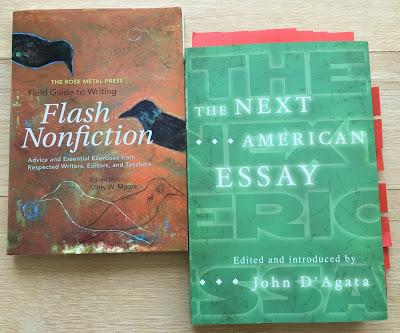
In contrast, The Next American Essay, part of John D'Agata's trilogy of anthologies for Graywolf, embraces subjectivity. D'Agata's voice is interspersed throughout the collection, which is arranged chronologically from 1975 into the early 2000s, via prose-passages that comment on the particular moment in American literature--and sometimes D'Agata's personal biography, and sometimes the larger pop culture. I don't know if the students will find those passages useful; I don't know if they'll find them at all. I cherrypicked individual essays from within a slightly overwhelming (if very well curated) 450+ pages. Then, because that selection lacked pieces of the last decade, I added another nine pieces of my choosing.
So these are authors whose essays we will give a close reading to:
John McPhee Barry Lopez James Wright Harry Matthews Eliot Weinberger Dennis Silk Fabio Morabito Susan Mitchell Sherman Alexie Susan Griffin Carole Maso Mary Ruefle Thalia Field Jenny Boully Eula BissMaggie NelsonKiese LaymonRoxane GaySarah EinsteinCarmella GuiolCamille Dungy
In addition, we have two weeks where we do not meet, so I've suggested hefty longform pieces--Joan Didion's "the White Album" and David Foster Wallace's "Ticket to the Fair," both conveniently anthologized by D'Agata --as supplemental reading.
Toward the end of my syllabus, I've included "A Note about the Reading":
In addition to the reading, they'll be writing two longform essays, which I hope will incorporate lyric elements inspired by the readings, and four flash nonfiction pieces inspired by Rose Metal Press prompts. How will it all turn out? I have no idea. But I'm excited to find out. Class starts in the three hours.

I decided to emphasize essays that incorporate lyric energy, by which I mean energy that is grounded in perception by (or will of) the author over the material, versus a topic’s intrinsic narrative or suspense centered in plot. Signature elements of a lyric essay usually include framing figurative language, raw juxtapositions, and unconventional structures--for example, a personal revelation embedded within a seemingly objective encyclopedia entry. Poets who crossover to nonfiction are often drawn to lyric forms, which I have written about here.
The great thing about teaching a class you've never taught before is that you get to envision everything from scratch--no preconceptions of the canon, nothing you're loyal to simply because you know it well. The terrifying things about a class you've never taught before is assembling a syllabus from scratch. I chose two core texts to anchor the workshop, which meets on Mondays, and will always include at least twenty minutes of craft talk before we segue to discussing student drafts.
The Rose Metal Press Field Guide to Writing Flash Nonfiction is a very straightforward and democratic guide, edited by Dinty Moore. Each contributor--including Bret Lott, Robin Hemley, Aimee Nezhukumatathil, and Norma Elia Cantú--offers a brief essay on different aspects of flash nonfiction, accompanied by a prompt and an exemplar. Other than his introduction to the form and, implicitly, his shaping of the table of contents, Moore's voice is absent from the RMP anthology; he is happy to step back and let the contributors speak for themselves.

In contrast, The Next American Essay, part of John D'Agata's trilogy of anthologies for Graywolf, embraces subjectivity. D'Agata's voice is interspersed throughout the collection, which is arranged chronologically from 1975 into the early 2000s, via prose-passages that comment on the particular moment in American literature--and sometimes D'Agata's personal biography, and sometimes the larger pop culture. I don't know if the students will find those passages useful; I don't know if they'll find them at all. I cherrypicked individual essays from within a slightly overwhelming (if very well curated) 450+ pages. Then, because that selection lacked pieces of the last decade, I added another nine pieces of my choosing.
So these are authors whose essays we will give a close reading to:
John McPhee Barry Lopez James Wright Harry Matthews Eliot Weinberger Dennis Silk Fabio Morabito Susan Mitchell Sherman Alexie Susan Griffin Carole Maso Mary Ruefle Thalia Field Jenny Boully Eula BissMaggie NelsonKiese LaymonRoxane GaySarah EinsteinCarmella GuiolCamille Dungy
In addition, we have two weeks where we do not meet, so I've suggested hefty longform pieces--Joan Didion's "the White Album" and David Foster Wallace's "Ticket to the Fair," both conveniently anthologized by D'Agata --as supplemental reading.
Toward the end of my syllabus, I've included "A Note about the Reading":
It is not your imagination if you find this reading list intensive. We have essays by thirty-some authors, plus lengthy suggested readings for the two weeks we do not meet in person. We will not always have a chance to discuss the readings fully, given the demands of our schedule.
Here is my motive: being well read as a writer is a form of currency. If you stay in the publishing world, you will find yourself part of a thousand conversations in which the names of authors are dropped. When that happens, I have found that if I have even one genuine point of reference—that one essay I read, for that one class—I can contribute to the conversation with confidence. When I have no familiarity with the author, I’m a little embarrassed. I fall silent.
So our reading list is intended to fill your coffers, Scrooge McDuck-style.
This is a pass / fail course with no pop quizzes. There may be days when you skim the reading and lay low during discussion, and no one is the wiser. That doesn’t make you a bad person—we all have weeks when we fall behind and need to cut ourselves some slack. But if you choose that path consistently, just be aware that you’re missing out. These readings, one and all, are ones that I wish that I’d gotten to digest during my MFA years.
In addition to the reading, they'll be writing two longform essays, which I hope will incorporate lyric elements inspired by the readings, and four flash nonfiction pieces inspired by Rose Metal Press prompts. How will it all turn out? I have no idea. But I'm excited to find out. Class starts in the three hours.

Published on August 29, 2016 11:17
August 23, 2016
Writing About Craft
One of the unique components of a low-residency graduate program is the residency itself, which is often designed using the template of writer's conferences such as those at Sewanee or Bread Loaf. For the University of Tampa MFA instructors, this might mean that in a given 10-day stretch we're giving a craft talk in our genre (~20 poets), plus perhaps a craft talk to all students, in multiple genres (~80 people). That is in addition to leading eight sessions of a workshop with our 4-5 students, which I always lead off with a 20-minute close reading of poems framed as craft discussion.
In other words: we've got craft coming out of our ears.
It wasn't until I began to teach that I came to appreciate the art of smart, incisive yet conversational craft writing. It wasn't until I began to teach that I realized we needed more of such prose published, especially by women and voices of color.
I'm not talking about book reviews. That is an important genre as well, but different in tone and intent. I've also encountered a lot of great self-reflexive craft pieces written in the past few years, views of "inside my process." Increasingly, such pieces are one of the myriad of ways we're asked to promote new work. Those are wonderful, but they often have hybrid qualities--they can very easily cross over into the realm of personal essay. I've worked in that mode myself, and will continue to do so, but I've really come to admire are crisp IM-personal essays that focus solely on outside authors and do not measure themselves by timeliness or relevance to a zeitgeist; they simply show us, line by line or phrase by phrase, how the language is exerting power on the page.
One of my other responsibilities at UTampa is giving a pep talk to the Third-Termers, who are responsible for generating a 25-page critical essay on top of their standard responsibilities. This often freaks them out, because it feels like an arbitrary hoop to jump; irrelevant to their aspirations as a "creative" writer. But a good writer is a good writer, period. Coming at this as a mentor, the point isn't that I'm going to lose sleep if someone's citations aren't in perfect MLA format. The point is that someone who can't strategize a 25-page essay is also going to struggle with sustaining 250-page novel, or sifting and organizing 50 poems.
The point, as well, is that the best gift you can make to a book you're passionate about, perhaps of a rarefied genre or by an author no longer with us, is to write something illuminative that makes others more likely to pick it up.
One of my resolutions, in choosing to accept more teaching roles while still prioritizing my writing, was that I would generate at least one or two substantive craft essays each year. Since any book aspirations I have in this regard are at least five years out, that leaves me in search of great journal venues that are open to essays about craft. Not too long ago, I surveyed friends and fellow writers for their favorite publishing spaces, and with their contributions in hand, I give you this list.
VENUES FOR WRITING ABOUT CRAFT
American Poets [General info]
American Poetry Review ["About Us" / Submittable]
Assay [Guidelines]
Blackbird [Guidelines / Submission Manager]
Brevity [Guidelines]
Cleaver [Submittable]
The Essay Review ["About" / "Submit"]
The Hopkins Review [Author Guidelines]
LitHub [General info]
Measure [ Guidelines / Submissions Manager]
N+1 ["Contact"]
Parnassus Poetry in Review ["Contact Us"]
Passages North [Submissions]
Poetry Foundation [Submittable]
Poetry Northwest [Guidelines / Submittable]
Poets and Writers [Guidelines]
Talking Writing ["General Guidelines" / Submittable]
The Tishman Review [Guidelines / Submittable]
TriQuarterly ["Submissions" / Submittable]
Writer’s Chronicle [Guidelines / Submittable]
Note: I've included a couple of magazines where the craft writing is delegated to a particular space, e.g. the "Writers on Writing" blog for Passages North.
Got a journal you think should be listed here? Let me know! I'm happy to expand.
~
P.S. - If you missed it, I just did a sprawling interview for The Mackinac, Issue 10 . This is a startlingly wonderful little journal that designs a custom "Liquor List" for each issue, in addition to a Spotify playlist. They asked me to send along two new poems, so I did. Thanks to the editors, Lenea Grace & Brookes Moody.
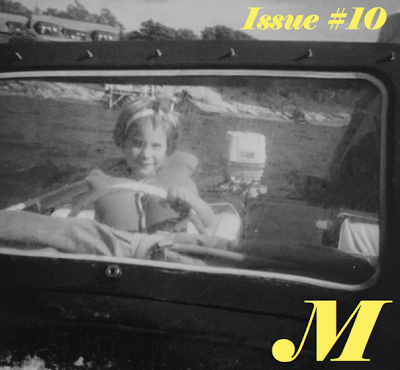
In other words: we've got craft coming out of our ears.
It wasn't until I began to teach that I came to appreciate the art of smart, incisive yet conversational craft writing. It wasn't until I began to teach that I realized we needed more of such prose published, especially by women and voices of color.
I'm not talking about book reviews. That is an important genre as well, but different in tone and intent. I've also encountered a lot of great self-reflexive craft pieces written in the past few years, views of "inside my process." Increasingly, such pieces are one of the myriad of ways we're asked to promote new work. Those are wonderful, but they often have hybrid qualities--they can very easily cross over into the realm of personal essay. I've worked in that mode myself, and will continue to do so, but I've really come to admire are crisp IM-personal essays that focus solely on outside authors and do not measure themselves by timeliness or relevance to a zeitgeist; they simply show us, line by line or phrase by phrase, how the language is exerting power on the page.
One of my other responsibilities at UTampa is giving a pep talk to the Third-Termers, who are responsible for generating a 25-page critical essay on top of their standard responsibilities. This often freaks them out, because it feels like an arbitrary hoop to jump; irrelevant to their aspirations as a "creative" writer. But a good writer is a good writer, period. Coming at this as a mentor, the point isn't that I'm going to lose sleep if someone's citations aren't in perfect MLA format. The point is that someone who can't strategize a 25-page essay is also going to struggle with sustaining 250-page novel, or sifting and organizing 50 poems.
The point, as well, is that the best gift you can make to a book you're passionate about, perhaps of a rarefied genre or by an author no longer with us, is to write something illuminative that makes others more likely to pick it up.
One of my resolutions, in choosing to accept more teaching roles while still prioritizing my writing, was that I would generate at least one or two substantive craft essays each year. Since any book aspirations I have in this regard are at least five years out, that leaves me in search of great journal venues that are open to essays about craft. Not too long ago, I surveyed friends and fellow writers for their favorite publishing spaces, and with their contributions in hand, I give you this list.
VENUES FOR WRITING ABOUT CRAFT
American Poets [General info]
American Poetry Review ["About Us" / Submittable]
Assay [Guidelines]
Blackbird [Guidelines / Submission Manager]
Brevity [Guidelines]
Cleaver [Submittable]
The Essay Review ["About" / "Submit"]
The Hopkins Review [Author Guidelines]
LitHub [General info]
Measure [ Guidelines / Submissions Manager]
N+1 ["Contact"]
Parnassus Poetry in Review ["Contact Us"]
Passages North [Submissions]
Poetry Foundation [Submittable]
Poetry Northwest [Guidelines / Submittable]
Poets and Writers [Guidelines]
Talking Writing ["General Guidelines" / Submittable]
The Tishman Review [Guidelines / Submittable]
TriQuarterly ["Submissions" / Submittable]
Writer’s Chronicle [Guidelines / Submittable]
Note: I've included a couple of magazines where the craft writing is delegated to a particular space, e.g. the "Writers on Writing" blog for Passages North.
Got a journal you think should be listed here? Let me know! I'm happy to expand.
~
P.S. - If you missed it, I just did a sprawling interview for The Mackinac, Issue 10 . This is a startlingly wonderful little journal that designs a custom "Liquor List" for each issue, in addition to a Spotify playlist. They asked me to send along two new poems, so I did. Thanks to the editors, Lenea Grace & Brookes Moody.

Published on August 23, 2016 01:23
August 16, 2016
Poetry in the Wild
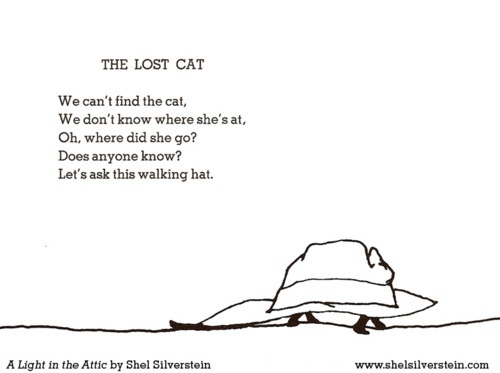
I've been emailing with a high school teacher, planning toward National Poetry Month events next April. A lot of poets sigh for dramatic effect when April comes around--and I sigh too, primarily in dread of figuring out my tax forms. But I'm thrilled by the travel, which in 2017 will take me to Russell Sage College in upstate New York and Auburn University in Alabama, as well as the opportunity to do local outreach.
Often, a conversation with a teacher includes a statement such as "Oh, good, we'll have just finished the poetry unit." But celebrating poetry in April would be so much easier if we didn't think of poetry in terms of "units," but rather an everyday presence. Kids grow up surrounded by language--newspapers and magazines, novels, comics and graphic novels, internet articles--and so they begin to absorb, organically, what makes for style and innovation in these modes. Part of the intimidation attached to poetry is that readers "new" to the genre worry that they aren't equipped to judge what is good. They don't trust their brain, which means they're afraid to get their hearts involved.
Those eight-year-olds who are passionate about Shel Silverstein? We need to find a way to keep them in the poetry fold. Those readers should become the eighteen-year-olds who are passionate about e.e. cummings.
All of which is to say, I'm a huge fan of initiatives that implement poetry into daily life.
In May, I got to serve as one of three judges for the student component of Arlington County's "Moving Words" competition, which puts the winners' work on metro buses all around town. I was startled by the images, originality, and intensity of voice. You can read all the winning poems here; as you'll see, age was no guarantee of dominance. My favorite, Lucy Rissmeyer's "Big Electric Cat," describes the cat's "Jelly bean toes, claws of broken glass."
September is on the horizon. Here are links to three of my favorite "public poetry" projects in 2016. I'd love to see a ten-minute discussion in every classroom that uses one of these projects, or something similar, to ask:
What makes us recognize these lines as poetry?
When you read it aloud, what words do you notice?
What would you do if you ran across this on your own?
How and where would you put poetry in everyday places?
What poem would you choose to display, and why?
Wall Poems in Charlotte, North Carolina
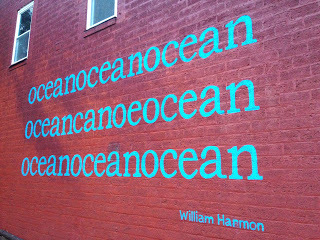 Photo by Amy Bagwell
Photo by Amy Bagwell
The concept is straightforward: take advantage of otherwise vacant wall space all around Charlotte by presenting brief, pithy poems in bright colors. The execution, directed by Amy Bagwell and her team, is unforgettable. For more on the Wall Poems initiative, check out their website . For a partial photo-"tour," go here.
Cookie Fortunes in Miami, Florida
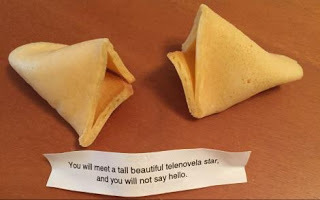
After your last slurp of spicy noodles, you reach for the satisfying crunch of a fortune cookie. Instead, you find a riff on Frank O'Hara's "Lines for the Fortune Cookies." Created by Benjy Caplan for the annual O Miami festival and distributed by the midtown outpost of Delivery Dudes. Check out all the 2016 O Miami Festival's projects.
Sidewalk Surprises in Boston, Massachusetts
Rain falls in downtown Boston, and a poem--perhaps Langston Hughes, perhaps Elizabeth McKim--materializes under your feet. Once stenciled, water-resistant "ink" lasts for about a month before naturally degrading. Mass Poetry's website has more on the project, curated by Boston's inaugural poet laureate, Danielle Georges.
If teachers started off every month of the school year with a mention of poetry in the wild, rather than waiting for "the poetry unit," perhaps April could feel a little more like a celebration, and less like an indoctrination.
P.S. - If you're wondering where I've been, the answer has largely been "writing essays" (more on that to come) and "in Florida," including our residency for the University of Tampa's MFA program and a week at the Hermitage Artist Retreat. I let this blog go dormant, and I took a Twitter hiatus, to see if I missed such things.
I did. So I'm back, and back on Twitter too--you can find me there @SandraBeasley.
P.S. pt 2 - I'm teaching TWO poetry classes for the first time with 24PearlStreet, which is the online learning component of the legendary Fine Arts Work Center in Provincetown . Each is designed as a one-week intensive. Each will feature a mix of guided readings, revision of existing drafts, generative prompts for new ones, and my line edits on a few poems of your choice.
"Your Voice: Work It, Raise It, Change It" October 10-14, 2016
We often regard the author’s voice as having an inherent, unchangeable quality. Many writers have invoked the analogy comparing one’s voice to a fingerprint. But one person's “fingerprint” is another person’s rut, and no poet should feel trapped in his or her voice.
&
"You Should Write Poems About That" January 23-27, 2017
We are writers, but not just writers. We bring different areas of expertise to the table—whether a profession, another creative passion, travel, or the experience of parenting a sick child. Have you ever had someone say “You should write poems about that,” and not known where to begin? This one-week intensive course unlocks that material.
FAWC just unveiled their roster for 2016-2017. It's a jaw-dropping list...
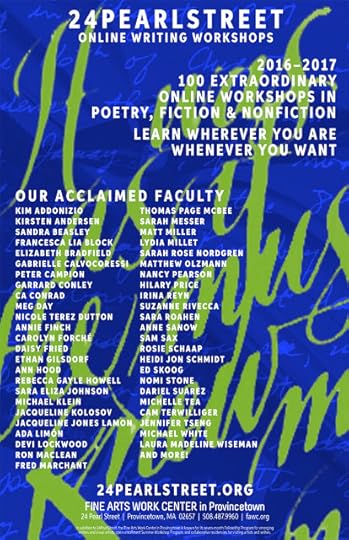
...but what they need to advertise more widely is that there are DISCOUNTS available for enrollment, namely:
-Early Registration Discount: Receive 15% off tuition if you register by October 1.
-MFA Discount: If you have or are earning an MFA in Creative Writing, use code MFA50 for 50% off any one-week intensive class.
If you're curious about these classes, email me; I'm happy to answer any questions.
Published on August 16, 2016 10:16
March 28, 2016
AWP 2016 & 2017 & Ad Infinitum
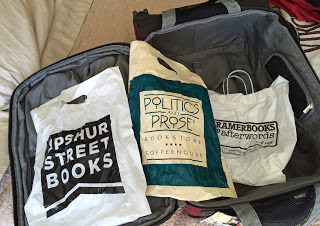
I am about to hop on a plane to Los Angeles, where I will spend 72 hours immersed in the annual AWP Conference, which brings 12-14K writers to one place. I always pack my high heels in plastic bags. Over the years, my plastic bags have acquired an accidental theme, as seen in my pre-packing snapshot.
If you offer me a button, I will wear it. If you buy me a martini, I will drink it. If you have a poem to read, I will listen. If you have a question, I'll probably screw up the answer, but I'll try.
In terms of simple self-care, I return to what my godmother Laura used to say: Never turn down the offer of water, Kleenex, or a chance to use the bathroom. There's all kinds of additional good advice out there about networking and/or shoes. In future years, I will probably have more to say about networking and/or shoes.
This is my fourteenth consecutive year attending the AWP Conference. My range of experience includes the euphoria of a book deal, fighting with loved ones, tears, food poisoning, being hit on by famous authors, a random hook-up or two (unrelated to the prior clause), expensive meals, Triscuit-and-tinned-oyster meals, moderating two panels, meaningful conversations with editors, elevator rides spent wondering "Do I say something?," 50+ hours on the Book Fair floor, several marathon offsite readings, dancing at the Black Cat with former students, and one truly raucous hotel room party. I feel pretty at home at the AWP Conference.
That comfort is a luxury. Not a fiscal one--I've paid for fourteen years out-of-pocket. It's easy to take for granted ways that we navigate the AWP conference maelstrom; ways that might feel out of reach for others, even though they are equally-if-not-more talented, equally-if-not-more craving the community of fellow writers.
If you're going to the AWP Conference this year, consider complicating your understanding of what's going on in these ways~
-Ever walked into a panel where the room is filled over capacity and people have hunkered down to sit along every available stretch of wall?
Imagine looking at the front of the room where your reserved seat waits and wondering how you're going to navigate across all those bodies, filling every aisle, using crutches. Or your wheelchair.
-Ever ignored a moderator's request for texts in advance--the poems you plan to read, or the statistics you plan to cite--because it's easier to plan morning-of? Ever tried to save money or please an aesthetic sensibility by squeezing the handout onto one page?
Consider that printing just 3-5 copies of a handout with a simple, enlarged font could meet the needs of visually-impaired members of our community.
-Ever waved off the offer of a microphone because "I talk plenty loud"?
Maybe you do talk plenty loud. Maybe the person after you doesn't. Set the standard, for the sake of hearing-impaired members of our community.
-Ever shot the glare o' death at the person whose infant keeps burbling, laughing, whining, or crying during the Very Important Tribute to the Very Important Poet in the Very Quiet Room?
Rest assured that parent is not bringing along his or her child because of a misdirected theory concerning postnatal aesthetic development. This is not about "Baby's First Villanelle." That parent is trying to preserve a sense of self, possibly in tandem with pressing professional expectations, in a system that offers no standardized options.
Your matter of convenience might be someone else's critical access point.
My privilege is profound. I have good sight and hearing; I can sprint from one panel to the next. I don't have to worry about child care. I am often in the so-called majority. But most of us have at least one scenario in which we are marginalized, whether the criteria be physical, emotional, racial, sexual, or fiscal. The nature of my food allergies is a lifetime of walking into rooms where for everyone else, it's time to party--and for me, it's time to strategize. Cake? Pizza? Where should I stand? What, or who, should I avoid touching? How's my breathing? Do my eyelids look funny? Can people tell my lips are swollen?
I like tote bags. I like a good hotel bar. I love seeing a writer I've never heard of before step to the microphone and tear it up. But I am thinking about these bigger matters, too, and I'm not the only one.
"Why Does Awp Writer’s Conference Continue To Refuse To Offer Child Care?" ~ Anna March for HipMama
The Lulu Fund: Supporting Racial, Gender, & Class Justice
"You're Invited to Braless AWP" ~ Karen Craigo
"Disabilities and Writing" ~ Josh Logue for Inside Higher Ed*AWP Disability Caucus"AWP Tips for Writers" ~ "Tipsy Tullivan" via YouTube
*As Karrie Higgins has pointed out, this article has some factual issues, and the headline premise of "debating" access is problematic at best.
In 2017, the AWP Conference comes back to Washington, D.C., in celebration of the organization's 50th anniversary. I'm not on the planning subcommittee; I'm not tenured faculty at any local school. But as someone who deeply loves her city--our capitol city--I want this to be a time and place where the conference's doors open wider. And the year after, opened wider still. We can do better.
*
If you'd like to cross paths in the real world, here are the best ways to do so between now and Saturday. Say hello! I am shyer than I look, but always happy to meet people. The codeword is: capybara.
Thursday, March 31
9-10:15 AM ~ Poets on Craft: “The Furious and Burning Duende,” with Mahogany L. Browne, Jacqueline Jones LaMon, and Pat Rosal, moderated by Danielle Barnhart ~ Room 404 AB of the Los Angeles Convention Center. (Presenting)
Lorca tells us that the artist is possessed by duende, a malign spirit that burns the blood like powdered glass. This panel asks if poets can or should summon duende at will. Is it fleeting and ephemeral, or can it be harnessed as an instrument of craft? Five poets who have written about and with duende share their experiences invoking the dark, elusive creative force. We promise fiery exchanges on this evocative subject.
11 AM-Noon ~ Signing for Count the Waves, hosted by W.W. Norton & Co. ~ Booth 613 of the Book Fair at the Los Angeles Convention Center. (Signing)
6:30-8 PM ~ University of Tampa Low-Residency MFA Cocktail Reception ~ Diamond Salon 9 on the Third Floor of the JW Marriott. (Co-hosting)
Friday, April 1
1:30-2:45 PM ~ Reading with 2014 AWP Award Series winners Charles M. Boyer, Sarah Einstein, Susan Muaddi Darraj, and Iliana Rocha ~ Room 503 of the Los Angeles Convention Center. (Introducing Iliana Rocha)
6-7:15 PM ~ Disability Caucus ~ Room 411 of the Los Angeles Convention Center. (Attending)
6-7 PM ~ VCCA Fellows Reunion ~ The Mixing Room in the Lobby of the JW Marriott. (Cohosting)
Saturday, April 2
1:30-2:45 PM ~ “Remembering Claudia Emerson” reading with Jill McCorkle, Emilia Phillips, Wyatt Prunty, Kathy Graber ~ Room 403 B of the Los Angeles Convention Center. (Participating)
Claudia Emerson’s death in late 2014 grieved her friends and her readers. This event features panelists remembering her spirit and her work and inviting audience members to participate by also reading her poems so that her single voice resonates through a chorus of witnesses. The panelists focus on her posthumous books, The Opposite House and The Impossible Bottle.
6-8 PM ~ Claudia Emerson Chapbook Award Reading with M.L. Brown ~ Far Bar Little Tokyo (347 E 1st St) in Los Angeles. (Reading)
Published on March 28, 2016 23:34
March 9, 2016
Here
During our MFA residency at the University of Tampa, a student asked about the value about speaking up against perceived inappropriate acts or inequalities in the writing world, versus protecting your particular holding. I pointed out that unless you have the courage to speak up, you aren't creating an opportunity for people to share your perception of a situation or offer their own experiences. You aren't creating a space for allying. Though you might be playing it "smart" by being diplomatic, you'll always feel slightly alone.
I have mixed feelings about circulating anonymous comments. I'm frustrated by being given a narrative out of context that conflates actions of concern with prejudicial judgments. So that's why I haven't linked to the VIDA "Report from the Field" that has been on many poets' minds this week. There's a possibility that the manner in which testimonies are gathered means that their circulation sparks a really important conversation--but then, ultimately, limits it.
That doesn't mean that I doubt the veracity of these testimonies.
Thomas Sayers Ellis is a brilliant poet and performer. I think he can be a warm, affable presence--perhaps "when he wants to be" is a necessary disclaimer there, so be it. He can be kind and generous. I appreciate what he has done for DC's artistic culture, particularly its poetics and the documentation of Go-go. I respect that he took Flat Langston and ran with it.
And: I believe these testimonies.
If my praise of TSE, in any context, ever meant that you felt you couldn't tell me about something that he said or did that made you feel vulnerable, I am so sorry. I wish we could have had that conversation.
Social media such as Facebook is, at the end of the day, an entertainment medium. You can use it; I sure do; but don't mistake anything that happens in this space as lasting consequence or judgment. What matters is what happens in the real world of a passion and profession so many of us share. The optimist in me hopes that the relative quiet on this issue in social media is because people are pursuing conversations in other poetry communities. I refuse to believe it's because people are just hoping this goes away. Don't dishonor these women who spoke up by dismissing them.
In my real life, here's the thing: I don't get to teach The Maverick Room or Skin, Inc., anymore. Dammit. Those are really good poems. I don't get to suggest him for teaching opportunities anymore. I won't agree to be on panels with him anymore. That makes me sad. But I'd rather be sad than complicit in the psychological abuse of others.
Support these women whose names I do not know yet. I hope, some day, we've created a space where they feel they can introduce themselves. As more than anything having to do with TSE, as more than victims, I want to hear about them as poets. Which is what they came to this community to be.
Support Jen Fitzgerald and Noemi Press. From Jen's blog post: "They understand, as I do, that when it comes to literature, there is more at stake than book sales." I cannot imagine how difficult that decision to alter the process on a forthcoming book must have been.
Support the Spring 2016 students at the University of Iowa Writers' Workshop, because when we sign up for a workshop with a visiting writer, we assume we're entering a healthy and neutral space.
I'm pretty sure that if Thomas Sayers Ellis sees this, he won't be wanting my support. He'll be angry. That's fair. But I don't think anyone's actions can be cast in such a revealing light without the realization--especially within someone as smart and insightful as he can be--that something needs to change. Something is gravely wrong. I want him to get support for that, wherever it needs to come from.
I am an eminently flawed human. Most poets are. Thomas and many others have managed to witness a few of my lesser moments, I'm sure. But I'm here, I'm listening. I'm here, on and off the screen.
Reports from the Field: Statements Against Silence - VIDA
My Statement March 7, 2016 - Jen Fitzgerald
For My Daughters - Fred Joiner
On Solidarity: You Cannot Stand with the Group If You Do Not Stand with the Individual - Meghann Plunkett
I have mixed feelings about circulating anonymous comments. I'm frustrated by being given a narrative out of context that conflates actions of concern with prejudicial judgments. So that's why I haven't linked to the VIDA "Report from the Field" that has been on many poets' minds this week. There's a possibility that the manner in which testimonies are gathered means that their circulation sparks a really important conversation--but then, ultimately, limits it.
That doesn't mean that I doubt the veracity of these testimonies.
Thomas Sayers Ellis is a brilliant poet and performer. I think he can be a warm, affable presence--perhaps "when he wants to be" is a necessary disclaimer there, so be it. He can be kind and generous. I appreciate what he has done for DC's artistic culture, particularly its poetics and the documentation of Go-go. I respect that he took Flat Langston and ran with it.
And: I believe these testimonies.
If my praise of TSE, in any context, ever meant that you felt you couldn't tell me about something that he said or did that made you feel vulnerable, I am so sorry. I wish we could have had that conversation.
Social media such as Facebook is, at the end of the day, an entertainment medium. You can use it; I sure do; but don't mistake anything that happens in this space as lasting consequence or judgment. What matters is what happens in the real world of a passion and profession so many of us share. The optimist in me hopes that the relative quiet on this issue in social media is because people are pursuing conversations in other poetry communities. I refuse to believe it's because people are just hoping this goes away. Don't dishonor these women who spoke up by dismissing them.
In my real life, here's the thing: I don't get to teach The Maverick Room or Skin, Inc., anymore. Dammit. Those are really good poems. I don't get to suggest him for teaching opportunities anymore. I won't agree to be on panels with him anymore. That makes me sad. But I'd rather be sad than complicit in the psychological abuse of others.
Support these women whose names I do not know yet. I hope, some day, we've created a space where they feel they can introduce themselves. As more than anything having to do with TSE, as more than victims, I want to hear about them as poets. Which is what they came to this community to be.
Support Jen Fitzgerald and Noemi Press. From Jen's blog post: "They understand, as I do, that when it comes to literature, there is more at stake than book sales." I cannot imagine how difficult that decision to alter the process on a forthcoming book must have been.
Support the Spring 2016 students at the University of Iowa Writers' Workshop, because when we sign up for a workshop with a visiting writer, we assume we're entering a healthy and neutral space.
I'm pretty sure that if Thomas Sayers Ellis sees this, he won't be wanting my support. He'll be angry. That's fair. But I don't think anyone's actions can be cast in such a revealing light without the realization--especially within someone as smart and insightful as he can be--that something needs to change. Something is gravely wrong. I want him to get support for that, wherever it needs to come from.
I am an eminently flawed human. Most poets are. Thomas and many others have managed to witness a few of my lesser moments, I'm sure. But I'm here, I'm listening. I'm here, on and off the screen.
Reports from the Field: Statements Against Silence - VIDA
My Statement March 7, 2016 - Jen Fitzgerald
For My Daughters - Fred Joiner
On Solidarity: You Cannot Stand with the Group If You Do Not Stand with the Individual - Meghann Plunkett
Published on March 09, 2016 12:56
December 31, 2015
Refreshing Your Journals in the New Year
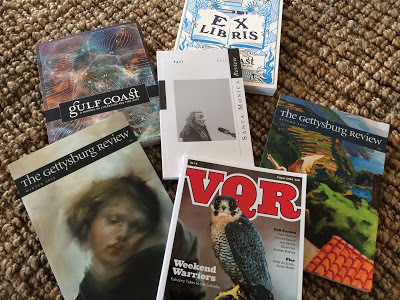
Like most folks, I have my handful of New Year's Day traditions. I simmer up black-eyed peas with greens for luck. We make a batch of Bloody Marys. I update my address book, write cards, and maybe have a few friends come by.
I also look around my one-bedroom apartment, in which my writing desk has to double as our dining table, and think, How can I clear out to create space for the new year?
If you're a writer, journal subscriptions are probably part of your world. We buy them to show our support for the editorial aesthetic, or because of an exceptionally fine bit of AWP swag, or because subscribing was built into a context fee. I get a half-dozen literary journals at any time, with slight variations from year to year--Gettysburg Review and Gulf Coast one year, AGNI and Georgia Review the next--plus comp and contributor copies. That's a whole lotta paper that comes marching into my mailbox.
When to read them all?
The truth is, most of my favorite journals are too bulky to grab for a Metro ride or stick in a carry-on bag. At the end of a long day, I'm more likely to reach for Real Simple, Washingtonian, or one of the other glossy mags that live on our coffee table. Sunday mornings are reserved for the New York Times. I have two books to read for teaching to students, another on the horizon for book club. I say to myself I want to save that issue for when I can give it the time it deserves.
So, the stack grows higher. And higher. Eventually, the prospect of reading transmogrifies from "anticipatory pleasure" to "looming guilt trip."
A few years back, I decided enough was enough. Here's my strategy:
-On or about New Year's Day, I round up all the unread journals in my house from the year before. There's usually at least six, and as many as ten.
-I give myself permission to leaf through, to skim, rather than reading everything. But when I find something I particularly love--an essay, poem, or short story--I flag it. The goal is to find one piece per issue, two max. Then I use the Contributor's Notes to find an email address for each of the authors. Sometimes this isn't possible, but there is usually an academic or other professional affiliation mentioned.
-The note! This is the best part. I keep it short and sweet, because I don't really know anything about this person (and vice versa). But I take the time to say I loved your piece, and maybe here's why. I say If you come to DC to read, please let me know. I say, particularly if it isn't someone with a book out yet, Please keep writing.
Sometimes I never hear back. Sometimes it is exactly what that person needed to hear. Sometimes quick notes turn into real, substantive correspondences.
The bonus: I can give myself permission to scootch these journals out the door, because I have honored the work. Which makes room for a new year of journals.
There's much meditation, at this time of year, on how we spend our time. I see a lot of people swearing off the internet, or turning email auto-replies on. But my online silences of the year past (some involuntary, some intentioned, some accidental) have only strengthened my sense of being a writer who thrives on engagement. Thanks for keeping an eye on this space. A flurry of end-of-year emails is just one small way I can give back to a community that offers me so much in return.
One other thing: Don't forget the jalapeño in the black-eyed peas.
Published on December 31, 2015 10:44
December 17, 2015
What's Next
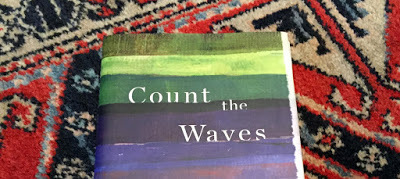
2015 was a more complicated year than expected. Everyone in my world was doing the heavy lifting of preserving finances, battling illness, and trying to focus plans for the future. I didn't spend time where or how I thought I would. Some things fell through.
I refuse to be permanently daunted. I might sleep in a few days more darkened winter mornings than necessary. I might fall off the internets for a month or two. But my takeaways to 2016 include a happy, healthy kitty (at last!); a collection of poetry bound for paperback; and a busy schedule of spring readings and travel.
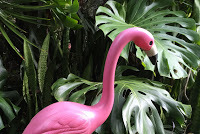 I want to write essays. I am ready to write essays. But first and foremost, I will always be a poet--and I'm so, so grateful to everyone who spent time with Count the Waves this year. That includes the painter who sent me a snapshot of my book sprawling on his Persian rug, and another of his "inner flamingo" navigating the palm fronds outside his home.
I want to write essays. I am ready to write essays. But first and foremost, I will always be a poet--and I'm so, so grateful to everyone who spent time with Count the Waves this year. That includes the painter who sent me a snapshot of my book sprawling on his Persian rug, and another of his "inner flamingo" navigating the palm fronds outside his home. 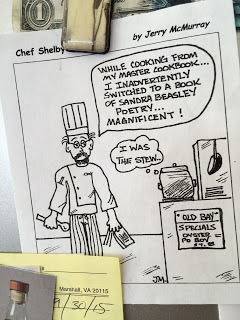 That includes the incredibly talented cartoonist down in Florida who sends funny, empathetic stories, who has shown me how poetry touches a life shaded in hardship. It has been years since I had a pen-pal. (My last official pen-pal-ship ended badly, when I tried to send her a gift--a hand-wrapped, decorated pencil--which got caught up in the USPS machines and shredded. Took two months for it to bounce back as "DAMAGED." She didn't realize I'd tried to reply and, hurt, fell into silence. I was 12.) That also includes the US Army JAG officer who, because he is used to the strange angles and compressions of writing in code, was drawn to the Traveler's Vade Mecum series. "I am [5450]," led off his note.
That includes the incredibly talented cartoonist down in Florida who sends funny, empathetic stories, who has shown me how poetry touches a life shaded in hardship. It has been years since I had a pen-pal. (My last official pen-pal-ship ended badly, when I tried to send her a gift--a hand-wrapped, decorated pencil--which got caught up in the USPS machines and shredded. Took two months for it to bounce back as "DAMAGED." She didn't realize I'd tried to reply and, hurt, fell into silence. I was 12.) That also includes the US Army JAG officer who, because he is used to the strange angles and compressions of writing in code, was drawn to the Traveler's Vade Mecum series. "I am [5450]," led off his note. 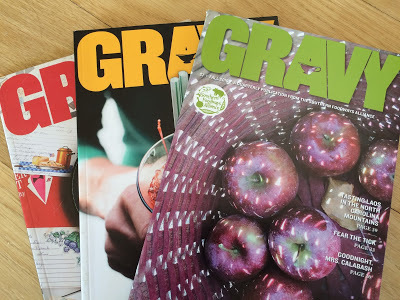
That includes the community of the Southern Foodways Alliance, which has been publishing my poems about Southern culinary traditions in their quarterly journal, GRAVY, which was honored with the 2015 James Beard Foundation Award for Publication of the Year. Our found rhythm includes working with artist Natalie K. Nelson, who has a great sense of humor. Her illustrations illuminate. The downside is that sometimes I worry that the "poetry world" doesn't realize I'm even writing poems. The upside is in October, I went down to Oxford, Mississippi, and read for an audience of restauranteurs, chefs, farmers, food purveyors and lovers. The experience was honestly the highlight of my year, entirely outside of any literati-industrial complex.
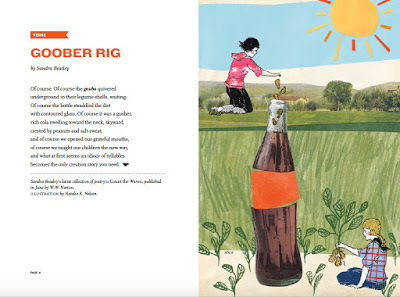
If there is a writer who has meant something to you in the past year, I can't say this loudly enough: reach out to her or him. Let authors know how their work, old or new, touched you. Sometimes such notes can be the lifeline in an otherwise impossible day.
I had a conversation the other night about that haunting question, "What's next?" We always hear it as judgment, e.g., What you've done so far is not enough. But it really is a vote of confidence. What's next? Everything. One word at a time.
Published on December 17, 2015 14:49



